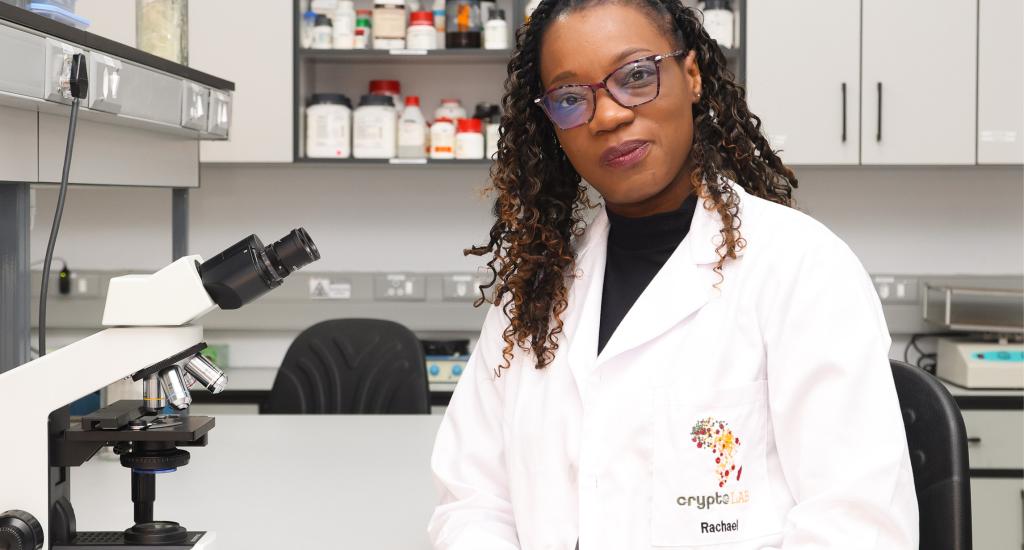Fighting brain infections: A young scientist’s mission to make a difference

Dr Rachael Dangarembizi is a pioneering force in neuroinfectious disease research, celebrated for her groundbreaking work on cryptococcal meningitis. Her dedication has not only secured major funding but also inspired and mentored the next generation of scientists, earning her global recognition in the field.
She is a senior lecturer at the Centre for Infectious Diseases Research in Africa (CIDRI-Africa) at the University of Cape Town (UCT). In July 2025, she was honoured with the TW Kambule-NSTF Award in the emerging researcher category.
The award ceremony, organised by the National Science and Technology Forum (NSTF) in partnership with South32, is widely regarded as South Africa’s ‘Science Oscars.’ It recognises and celebrates outstanding achievements in science, engineering, technology, and innovation across the country.
“The award is a deeply meaningful recognition of the importance of advancing brain research in Africa, particularly in the neglected area of neuroinfectious diseases like cryptococcal meningitis,” she said.
For Dangarembizi and her team, the award is an affirmation that their work is not only scientifically impactful but also socially relevant, tackling critical challenges faced by communities.
Brain health
Based at the Neuroscience Institute at the UCT, Dangarembizi’s doctoral training focused on neuroinfections, and her current research centres on fungal infections of the brain. As a neuroscientist, she studies how the brain works in both health and disease.
“A healthy brain helps us to control bodily functions, including movement, vision, hearing, memory, language, emotions and behaviour. Brain diseases and brain damage affect these normal functions, and this can result in disability and death,” she explained.
Examples of brain diseases include stroke, epilepsy, meningitis and depression. Neuroscientists work to understand the causes of these conditions and develop treatments.
Current research
Dangarembizi’s current research focuses on uncovering the causes of brain injury in cryptococcal meningitis – a deadly fungal infection of the brain that affects people with weakened immune system, including those living with HIV and AIDS, cancer patients and individuals undergoing treatments that suppress the immune system. It is very difficult to treat and remains a leading cause of death for people living with HIV and AIDS in Africa.
“It is associated with about 200 000 deaths each year globally, the majority of which are from African. Growing up in Southern Africa, I have seen, the devastating consequences of HIV-associated opportunistic infections. We lost family and friends to these diseases during the peak of the HIV pandemic.
Science-based solutions
“As a scientist, I believe in the power and potential of using scientific research to generate solutions. Therefore, I have dedicated my career to develop scientific approaches for tackling one of the biggest challenges that Africa has had to deal with and continues to grapple with,” said Dangarembizi.
The neuroscientist shares that her fascination with the natural sciences has guided her diverse career, with past experience spanning biochemistry, microbiology and general medical physiology.
“Of all the body systems I have worked on, the brain is the most complex and yet the most intriguing of them all. I, therefore, decided to pursue a PhD in neuroscience and thereafter started my career as a neuroscientist,” she said in an interview with Public Sector Manager magazine.
Achievements
Among her most recent accolades, she was honoured with the African Research Leader Award from the UK Medical Research Council. The highly competitive award recognises “rising stars” in African research who are conducting exceptional, high-quality work that addresses critical global health challenges.
Dangarembizi has also secured multiple grants, including a recent funding from the Wellcome Trust and the Gabriel Foundation.
Ground-breaking solutions
“One of the most meaningful moments in my career was seeing the successful establishment of the first lab in Africa dedicated to studying brain injury in cryptococcal meningitis,” she said.
During her PhD studies, Dangarembizi had to travel to Europe to conduct her research because no local laboratory had the capacity to support the advanced work she was undertaking at the time.
Just five years after completing her PhD, she established the very lab that now empowers scientists to train and mentor young African researchers, fostering globally competitive science right here in Africa.
“This is deeply inspiring to me, every day,” she said.
As a Senior Lecturer, her key responsibilities include teaching, training, research and community service. She primarily teaches neuroscience to medical and allied health science students, and supervises Master’s, PhD and postdoctoral candidates pursuing careers in neuroscience.
“...part of my work involves educating the community about brain diseases, brain infections, brain injury and mental health disorders and how these can be both prevented or treated,” she said.
Her message to young scientists is that curiosity, perseverance and passion are their greatest tools on the path to discovery and impact.
“The path is not always easy, but if you remain committed to asking important questions and seeking solutions that matter, you can make a real difference,” she concluded.




